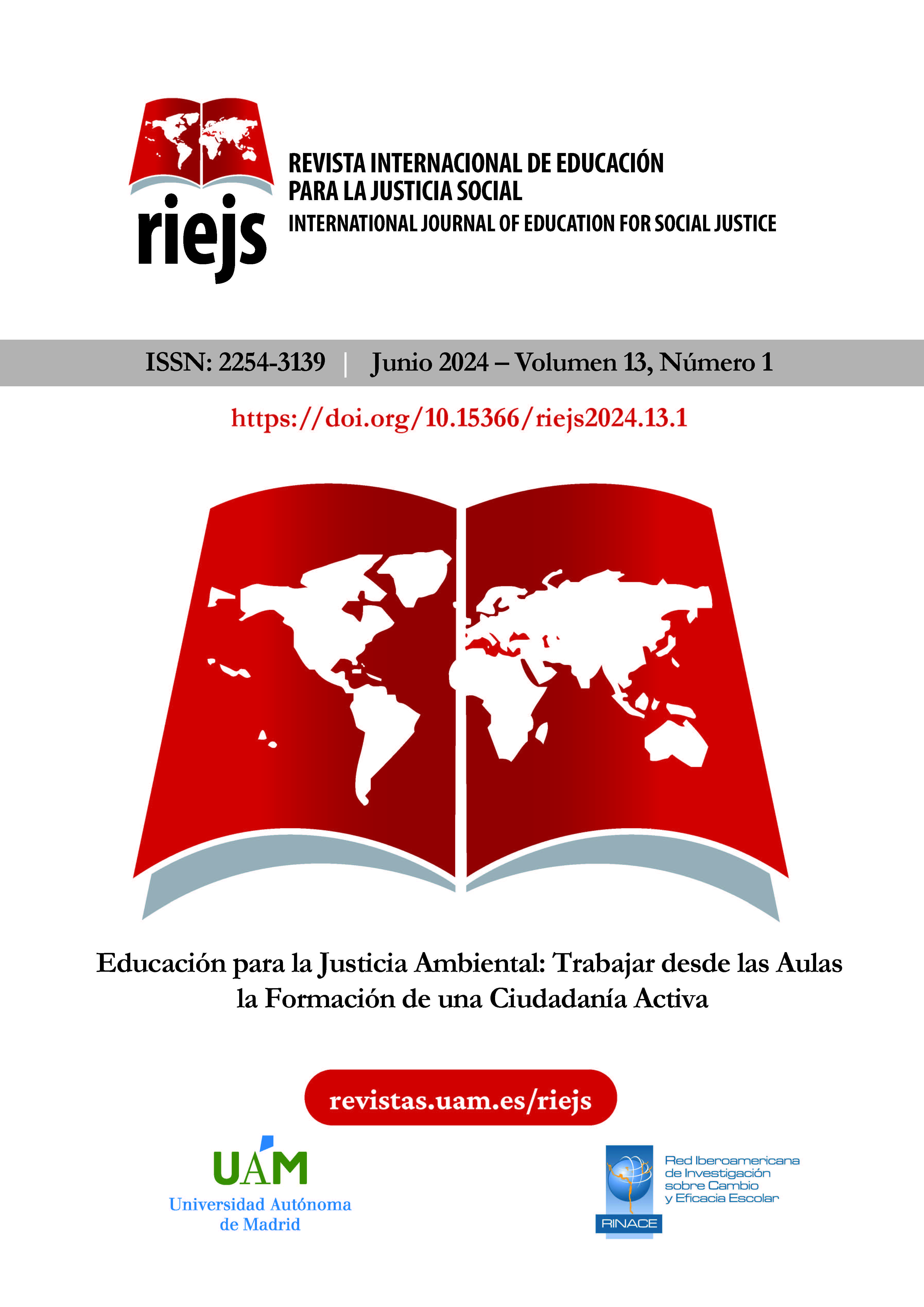Primary School students’ Ecocitizenship Competence in the Face of Biodiversity Loss
Keywords:
Emotional expressions, Actions, Biodiversity, Ecocitizenship, Social justice
This work is licensed under a Creative Commons Attribution-NonCommercial-NoDerivatives 4.0 International License.
Abstract
The following research aims to delve into the ethical and political stances that constituite the dimensions of eco-citizenship defended by Sauvé among primary school students in the face of biodiversity loss, which is one of the challenges humanity will have to confront in the coming years. Data were collected through focus groups with primary school students who participated in an educational project on schoolyard fauna. The results have allowed us to understand the ethical stance towards the issue, characterizing the emotional expressions manifested by the students, and, on the other hand, to understand their political stance through proposals for actions to improve biodiversity at the global and local levels. Students perceive human beings as the main cause, and, at the same time, as affected by this loss, experiencing sadness and anger at the loss of biodiversity. Parallel to this, throughout the educational project, we see a change in the type of actions proposed to improve biodiversity, suggesting more collective contributions
Downloads
References
Assadourian, E. y Mastny, L. (2017). Educación ecosocial: Cómo educar frente a la crisis ecológica. Informe Anual del WorldWatch Institute.
Castro-Carpio, A. y Leal-Díaz, D. M. (2023). ¿Educación ambiental o educación para el desarrollo sostenible? El sentido ético de la educación ambiental. Revista Kawsaypacha: Sociedad y Medio Ambiente, 11, art 7. https://doi.org/10.18800/kawsaypacha.202301.A007
Convention on Biological Diversity. (2021). First draft of the post-2020 global biodiversity framework. Convention on Biological Diversity.
Davidson, D. (1980). Toward a unified theory of meaning and action. Grazer Philosophische Studien, 11(1), 1-12.
Limón-Domínguez, D. (2019). Ecociudadanía: Retos de la educación ambiental ante los objetivos de desarrollo sostenible. Octaedro.
González Reyes, L. y Gómez Chuliá, C. (2022). La competencia ecosocial en un contexto de crisis multidimensional. Revista Internacional de Educación para la Justicia Social, 11(2), 29-43. https://doi.org/10.15366/riejs2022.11.2.002
Herrero, Y. (2016). Ecologismo: Una cuestión de límites. Encrucijadas: Revista Crítica de Ciencias Sociales, 11, 3.
Hufnagel, E. (2015). Preservice elementary teachers' emotional connections and disconnections to climate change in a science course. Journal of Research in Science Teaching, 52(9), 1296-1324. https://doi.org/10.1002/tea.21245
Hufnagel, E. y Kelly, G. J. (2018). Examining emotional expressions in discourse: Methodological considerations. Cultural Studies of Science Education, 13(4), 905-924.
Jensen, B. B. y Schnack, K. (1997). The action competence approach in environmental education. Environmental Education Research, 3(2), 163-178. https://doi.org/10.1080/1350462970030205
Jensen, B. y Schnack, K. (2006). The action competence approach in environmental education. Enviornmental Education Research, 12, 471-486. https://doi.org/10.1080/13504620600943053
Jiménez, I., Amat, A. y Codony, L. (2021). The wolf is back! Revisiting the concept of the ecological niche to predict the viability of the wolf population with elementary students. Journal of Biological Education, 57(4), 791-810. https://doi.org/10.1080/00219266.2021.1979626
Killinc, A., Ye?ilta?, N. K., Kartal, T., Demiral, Ü. y Ero?lu, B. (2013). School students’ conceptions about biodiversity loss: definitions, reasons, results and solutions. Research in Science Education, 43(6), 2277-2307. https://doi.org/10.1007/s11165-013-9355-0
Krainer, A. y Guerra, M. (2019). Ética y filosofía ambiental. Letras verdes. Revista Latinoamericana de Estudios Socioambientales, 26, 9-10.
Korsgaard, C. M. (2004). Actuar por una razón. Anuario Filosófico, 37(3), 645-677. https://doi.org/10.15581/009.37.29366
Lincoln, Y. S., Lynham, S. A. y Guba, E. G. (2011). Paradigmatic controversies, contradictions, and emerging confluences, revisited. En N. Dezin e Y. Lincon (Eds.), The Sage handbook of qualitative research (pp. 97-128). Sage.
MacGregor, S. (2014). Ecological citizenship. En VVAA. (Eds.), Handbook of political citizenship and social movements (pp. 107-132). Edward Elgar Publishing. https://doi.org/10.4337/9781781954706.00013
Mayring, P. (2014). Qualitative content analysis: Theoretical foundation, basic procedures and software solution. Klagenfurt.
Madorrán, C. y Almazán, A. (2022). Presentación. Alfabetización ecosocial: Fundamentos, experiencias y retos. Revista Internacional de Educación para la Justicia Social, 11(2), 7-9.
Morín, E. (2006). El Método VI. La ética. Cátedra.
Pérez, E. G. (2009). ¿Por qué ética y educación ambiental para el desarrollo sostenible? Ingeniería Industrial. Actualidad y Nuevas Tendencias, 1(2), 83-108.
Rekondo, M., Espinet, M. y Llerena, G. (2015). La construcción discursiva de la competencia eco-ciudadana en la escuela: La realización de un diseño tecnológico colaborativo en agroecología escolar. Revista Investigación en la Escuela, 86, 7-19.
Roldán-Arcos, S., Pérez Martín, J. M. y Esquivel-Martin, T. (2022). Educación para la justicia ambiental: ¿Qué propuestas se están realizando? Revista Internacional de Educación para la Justicia Social, 11(2), 11-27. https://doi.org/10.15366/riejs2022.11.2.001
Sauvé, L. (2013). Educación ambiental y ecociudadanía. Dimensiones clave de un proyecto político pedagógico. Revista Científica, 18, 12-23.
Sauvé, L. y Villemagne, C. (2015). La ética ambiental como proyecto de vida y “obra” social: Un desafío de formación. Revista de Investigación educativa, (21), 189-208.
Sauvé, L. (2017). Educación Ambiental y Ecociudadanía: Un proyecto ontogénico y político. Revista Eletrônica do Mestrado em Educação Ambiental, 73, 261-278. https://doi.org/10.14295/remea.v0i0.7306
Sauvé, L. y Asselin, H. (2017). Educar para la ecociudadanía: Contra la instrumentalización de la escuela como antesala del mercado del trabajo. Teoría de la Educación: Revista Interuniversitaria, 29(1), 217-244. https://doi.org/10.14201/teoredu2017291217244
Taylor P. (2005). La ética del respeto a la naturaleza. UNAM.
Turner, J. H. y Stets, J. E. (2006). Sociological theories of human emotions. Annual Review of Sociology, 32, 25-52. https://doi.org/10.1146/annurev.soc.32.061604.123130
Wandersee, J. H. y Schussler, E. E. (1999). Preventing plant blindness. The American biology teacher, 61(2), 82-86. https://doi.org/10.2307/4450624
Zembylas, M. (2004). The emotional characteristics of teaching: An ethnographic study of one teacher. Teaching and Teacher Education, 20(2), 185-201. https://doi.org/10.1016/j.tate.2003.09.008

